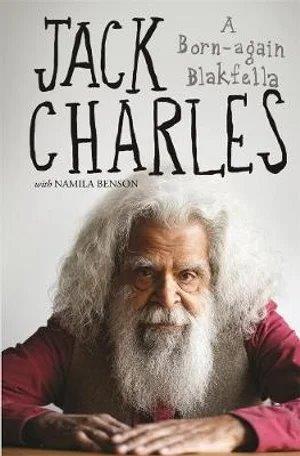Although actor Jack Charles credits Namila Benson with being his ‘ghost writer’, the high energy of the voice in ‘Born-again Blakfella’ and a degree of colloquial informality convey a warmth and authenticity that are uniquely his, and Benson’s role as scribe or editor is discreet. The subject matter is confronting; occasionally so too is the language. These aspects of the narrative will persuade some educators and parents that the book will work best as a title for individual reading, rather than as a set text. Some may even challenge its inclusion in a school library collection. Charles’s frank account of his slide into living with addiction, his criminal activity, and the open acknowledgement of his sexuality may make them cautious.
But for those adult caregivers who do facilitate access for older readers and young adults, the rewards of this autobiography will be significant. Without self-pity and with surprising restraint, 78-year-old Charles tells the story of being one of the Stolen Generations - removed as a baby from his mother, like his ten siblings, and forced into a notorious institution and later into foster care. In one heartbreaking scene from his childhood, a married couple invite him for a day out. He has such a wonderful time that when they promise to repeat the outing a week later, he spends days choosing his best clothes and anticipating their second visit. They never turn up, and they give him no explanation. That is the day Charles says he loses his faith in Christianity.
‘Born-again Blakfella’ is not a long book, and in some ways it is simply told, but its emotional intelligence is complex and engaging. At times its restraint suggests the depth of hurt Charles experienced as a child; at other times many years of self-healing are clear in his determination not to dwell on the failure of his one perfect relationship with a man, for example, or the sad state of his mother’s life when at last he finds her. Along the way, there is laughter and resilience, particularly in the exploration of his talent as an actor.
Young readers will want to discuss the tentative exploration of his Dreaming in adulthood. Breaking into the homes of wealthy Melburnians, through the dog flap, then communing with the dog’s spirit, so it will not alert its human owners. Charles relates such scenes with a straight face, but a somewhat self-deprecatory grin. There is no doubt that he values the way his Aboriginal identity has come to replace his former Christian faith. But he also has a performer’s ability to stand outside it and enjoy a contrary perspective.
Less resolved are the moments when he tries to justify stealing from white Australians as collecting ‘the rent’, set against a conviction that absolutely nothing can justify the invasion of personal space. The narrative leads to both conclusions. Readers will find in ‘Born-again Blakfella’ ample evidence of the shameful suffering inflicted on Aboriginal Australians, and yet in the author’s energy and laughter there is an unexpected similarity to A B Facey’s ultimate conclusion about his own struggle: that it has been in some ways a strangely ‘fortunate life’. That comparison alone would be ample justification for giving young people the opportunity to read this remarkable life story of a man somewhat belatedly called a national treasure.

